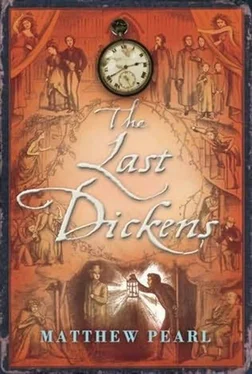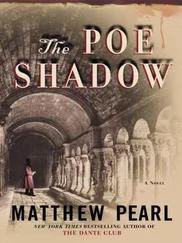“That novel I read in a single day,” Henry said happily.
Dickens continued. “I told Poe what I knew about its strange construction-that Godwin had written the hunting down of Caleb first. Only later did he decide how to account for it, and he wrote the first half of the book afterward. Poe said that he himself wrote his stories of ratiocination backward. He wanted more than anything for me to see him as a common spirit so that I might find him an English publisher, which I later tried but failed to do with Fred Chapman. Nobody knew much of Poe then and to print American writers was a risky venture. He was certain Europeans could appreciate him better than the Americans. Poor Poe took fire at me after that, a miserable creature.” Dickens seemed immediately sorry to have said that. “He was a disappointed man, you know, in great poverty. It may be my mood, or my anxiety, or I know not what else that makes me think of him now.”
Two readings in Philadelphia were followed by four in Washington and then two in Baltimore. At the first Washington stop, congressmen and the ambassadors of almost every country attended, as did a stray dog that passed by the police guards and began howling during the reading. President Johnson attended all of the Washington readings and invited Dickens and Dolby to the White House on the novelist's birthday, although Dickens's illnesses had grown worse. Dickens was certain, after the visit, that Andrew Johnson would manage well despite talk of his undoing for trying to push reconciliation with the Southern states through an unfriendly Congress. “That is a man who must be killed to be got out of the way,” Dickens commented to Dolby afterward.
Dolby soon left Washington for Providence to arrange ticket sales there while the others went on to Baltimore before returning to Philadelphia. On one of the longer train rides, the whole group exhausted, Dickens stirred from a deep, uncomfortable sleep.
“What are you smiling at, my lad?” he asked Tom, who was sitting across from him.
“You've been asleep,” Tom said, his pleasant smile remaining in place.
Dickens thought about it. “I have, sir! And I suppose you're going to tell me that you haven't closed an eye.”
At Baltimore, seemingly spurred by his own harsh words on the train to Philadelphia, Dickens located Maria Clemm, Edgar Poe's mother-in-law who was living by the charity of the state.
“This was the very same building where he died,” the old woman said when she was brought to the courtyard of the Church Home where he sat waiting with Tom. “It was a hospital then. Were you a friend of Eddie's? Do you know what happened?” she asked absently. The attendant had already explained who he was, but she had forgotten.
“I am a brother writer. Every author, my dear Mrs. Clemm, every poet and every editor, has known his despair,” said Dickens gingerly. He entreated her to accept $150 for her care.
Dolby reunited with the party again in Philadelphia on the night of the farewell reading there. The manager had stopped directing calculated glances of anger at Tom over the Christmas Eve debacle; instead, he just ignored him. Dolby had enough to agitate him now. The advertisement circular for the Hartford engagement had been printed to say that the reading would last two minutes and that the audience members should arrive at least ten hours early to claim their seats.
Dickens only laughed but was surprised to see Dolby so angry about the circular.
“My dear Dolby,” Dickens said, gesturing toward a chair. “You seem to be at your wits’ end today. Don't be too serious about the papers. Why, depending on what American paper you read, my eyes are blue, red, and gray, and the next day I'm proven a Freemason. You know, I used to suffer intensely from reading reviews of my books before I made a solemn compact with myself that I simply would not read them, and I have never broken this rule. I am unquestionably the happier for it-and certainly lose no wisdom.”
The manager shook his head somberly and sat down. “The papers can use me up all they like, Chief. Let them, the pudding-head business and all the rest! I did not wish to worry you, but I received a visit from an agent from the Treasury Department, claiming we owe five percent on all proceeds in America.”
“Five percent!” Dickens exclaimed. “Is the fellow correct?”
“No! But he threatens to confiscate our tickets and any property we have and to take us prisoners if we try to leave the country. I have written some letters to lawyers in New York, but they have been slow in replying.”
“Fancy that!” Dickens tried to keep his tone light. “Well, we made friends in Washington, didn't we?”
“We had nearly every member of the political class at your readings!”
“I'd wager they would happily use their influence to swat away this pest, don't you think? Take a trip back there.”
Dolby went back to Washington for a day as instructed. He dined with the chief commissioner of Internal Revenue of the federal government, who confirmed that Dickens's readings were considered occasional and, as such, exempt.
“We will always have rogue collectors, a rowdy element here and there in this bureau,” the commissioner said to Dolby apologetically when writing out a letter at the table. “Why, Congress had to even investigate the tendency of some of our men to make, well, ungentlemanly demands of some of the new women bookeepers in Treasury. Keep my letter with you, Mr. Dolby. It should stop the mischief. Many of the collectors in the eastern states, you see, are Irish, and suffer greatly from Anglophobia. We hope to enlighten them yet with visits like yours from our English cousins.”
Returning immediately to Boston, to a Saturday dinner planned for Dickens and Dolby at the Fieldses’, felt like being home again when compared with their recent itinerant lives.
They took a long walk around Boston before the meal. The amiable Mr. Osgood pointed out places of interest. So much was being built. The Sears Building, at the moment formless piles of stone and dust and scaffold, was said to be on its way to be a grand palace of offices and shops of seven stories. “There,” Osgood said, pointing to it, “shall be Boston's first steam elevator when this building is finished. You see, they say that is where it will go.” A space had been left in the middle of the construction on each floor, at the very bottom of which was an engine room with a steam pump connected to a series of pipes extending to the top of the building. There was an elaborately decorated elevator car, like a small parlor room, resting on its side by the building.
“Before long, they say,” Osgood commented, “nobody will use stairs at all and we shall save the lives of fifty persons a year who die by falling down stairwells. I only wonder whether things in Boston have begun to change too rapidly to comprehend them. We will all move up and down by steam power.”
“Any politician with that platform has my vote,” said Dolby, who was openly spiteful of walking as much as was required by Boston and Dickens.
Joining the dinner at the Fieldses that evening was Ralph Waldo Emerson, who had come from Concord. Unlike most of the Cam-bridge literary delegates-Longfellow, Lowell, Holmes-Emerson seemed only half interested in Dickens as a man and even less in Dickens as a writer. Yet the Concord Sage could not help laughing at Dickens's singing an old Irish ballad (“Chrush ke lan ne chouskin!”) over punch that Dickens made for the group; Emerson's laughing, in spite of his best philosophies, looked as if it must hurt.
There were several other grim faces at dinner that, like some imperceptible force, spread a dark cloud over the levity. The faces belonged to high-level Massachusetts politicians who insisted that after President Johnson's rash dismissal of the secretary of war, impeachment had become all but certain. The leaders of Congress were in secret meetings through the night. Chaos was in the air.
Читать дальше












